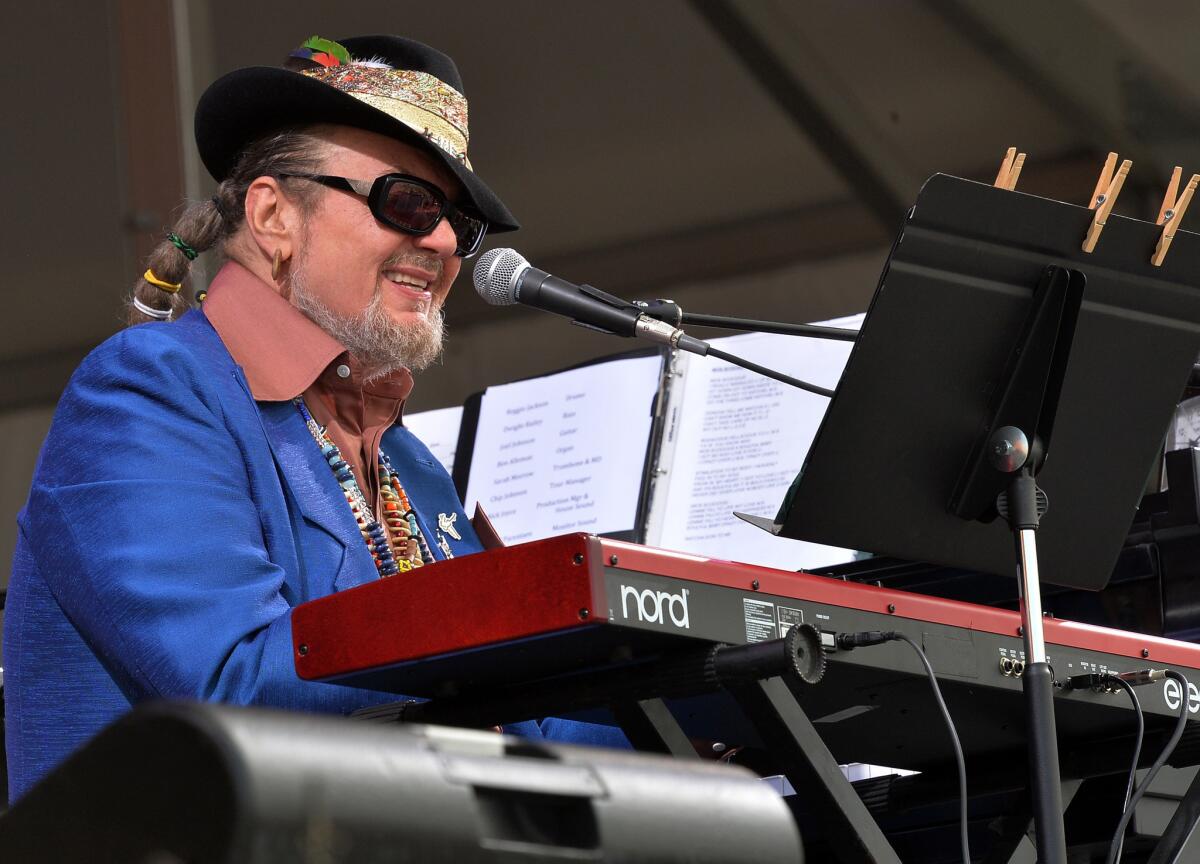Dr. John infuses Louis Armstrong tribute album with ‘Spirit of Satch’

- Share via
Tribute albums come and go, but it’s a real rarity that can snap a listener to attention like Dr. John’s new salute to jazz founding father Louis Armstrong.
From the opening notes of “Ske-Dat-De-Dat: The Spirit of Satch,” arriving Tuesday, it’s obvious this is no Big Easy re-creation of the best-known recordings by Armstrong, who in the 1920s almost single-handedly changed the course of popular music with his revolutionary vocal style and trumpet playing.
“He came to me in this dream and said, ‘Do my stuff — your way,’” said the 73-year-old pianist and leading light of New Orleans funk and R&B born Malcolm John “Mac” Rebennack Jr.
“Ske-Dat-De-Dat” turns many of the songs Armstrong recorded inside out and upside down, fast-forwarding them to 2014 with hip-hop beats, funk grooves and wildly inventive horn arrangements that are the work of John and his co-producer and arranger for the project, trombonist Sarah Morrow.
“To be honest,” Morrow said in a separate interview, “every song was different. The one thing Mac said from the beginning is that he wanted it to be fresh. So the approach for each one really depended on the song.”
The album features a raft of special guests, and many, logically, are trumpeters and Crescent City natives (Nicholas Payton, Terence Blanchard and Wendell Brunious), while many hail from places far beyond (Arturo Sandoval, Bonnie Raitt and Anthony Hamilton).
John and Morrow balanced Armstrong classics with lesser-known choices including “Dippermouth Blues,” “That’s My Home” and “Memories of You.”
In Armstrong’s hands, “What a Wonderful World,” was a lullaby-like ballad, sung by the man who took jazz beyond New Orleans to virtually every corner of the Earth. In Dr. John’s reworking, it becomes a rollicking ode of joyful celebration.
Instead of the swinging, finger-popping slant of Armstrong’s take on Kurt Weill and Bertolt Brecht’s “Mack the Knife” (an arrangement Bobby Darin lifted wholesale for his hit 1959 recording), Dr. John rides a heavy New Orleans funk backbeat driven by percolating bass and drums and peppered with thick, saucy horn accents.
It’s Dr. John’s way of inhabiting without simply mimicking Armstrong’s reshaping of popular music nearly a century ago. He didn’t invent jazz, but he fully embodied and popularized its introduction of individual expression and improvisation rooted in African American culture. These elements had titanic repercussions not only in jazz, big band and pop music of the time but also on through the birth of rock ‘n’ roll and the advent of funk and hip-hop.
Growing up in New Orleans, Dr. John was immersed in the city’s rich musical atmosphere, a milieu amplified by time spent at the record store his father operated.
Customers would regularly share their musical passions, exposing the young man to a broad spectrum of music that would coalesce into a multifaceted sound that emerged in the late ‘60s through a psychedelic-minded alter ego, Dr. John, a.k.a. “The Night Tripper.”
Armstrong cast a long shadow over his hometown. Still, after World War II, he became a divisive figure in music circles, lauded by musicians who valued the city’s musical traditions but derided by many bebop jazz players as a relic of the past, a past steeped in racism toward African Americans.
Throughout his life, Armstrong remained a genial bandleader, taking groups overseas to spread jazz and goodwill to international audiences — an establishment role that didn’t always sit well with black activists during the civil rights era.
Yet Armstrong’s musical influence endured, and after his return to the top of the pop charts in 1964 — at the height of the British Invasion — with the title track from the hit Broadway musical “Hello Dolly!,” he placed several more records on the charts before his death in 1971 at age 69. He even made it back to the Top 40 in 1988 — 17 years after his death — when “What a Wonderful World” was featured prominently in the film “Good Morning, Vietnam.”
“I felt like Louis, as an ambassador to the world from New Orleans, was a good thing for the city,” said Dr. John. His Dec. 6 tour stop at UCLA is a go now that he’s rebounded from a recent illness — “We don’t know what I had,” he said in his thick New Orleans drawl, “but whatever it is, it’s OK now.”
As for the second half of his new album’s title, “The Spirit of Satch,” determining how to keep far-flung arrangements in the spirit of the project’s namesake was both an indefinable and instinctual call.
“I tried to make the songs fit me the best I could,” he said. “I hope I was always true to the music. I have no idea what the world’s gonna ever say about what that is. But you know what? I felt like I gave it my best.”
More to Read
The biggest entertainment stories
Get our big stories about Hollywood, film, television, music, arts, culture and more right in your inbox as soon as they publish.
You may occasionally receive promotional content from the Los Angeles Times.











